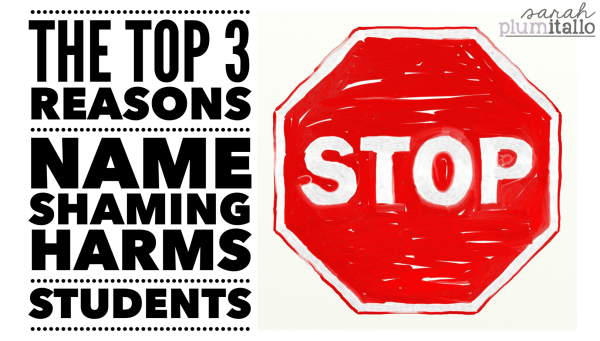You’ve seen the memes. The late night comedy bits. Maybe you’ve even been a part of a conversation or laughs in the teacher’s lounge. Odds are, if you’re a teacher, you’ve encountered name shaming. You know – “Did you SEE my class list? How do I even pronounce half these names? What were their parents thinking?!” or “You’ll never believe it. Another Neveah.“
I’m here to tell you that name shaming needs to stop.
A fleeting giggle or likes on a meme are not worth the consequences of shaming children (who become adults) about their names.
Here are my top 3 reasons name shaming harms students and must end.
1. Name shaming sets you up for a failed home-school relationship.
You can’t laugh about, joke about, or roll your eyes at a student’s name without passing judgement on their family. (And that judgement? It can impact their educational attainment. Here’s another source if you don’t like the first one.) They did not choose their own name – their parents or guardians did. Odds are, if you’re comfortable enough to laugh about a student’s name, you’re going to begin to make other judgments about that family. Think about it: if you’re making fun of someone, do you have a lot of respect for them? Empathy? No, you do not. Respect and empathy are two keys to successful home-school relationships. Without them, you’re facing an uphill battle.
2. Name shaming impacts student outcomes.
Students with uncommon names are more likely to be bullied, more likely to be suspended, and less likely to be found to be trustworthy. These things are not because of a student’s name – it’s because of our response to their name. We – the adults, the teachers, the other parents, other students – create situations in which students can develop low self-esteem, want to distance themselves from their culture, etc. all because of how we respond to their name. When we name shame, we demoralize – and we all know as educators that if there isn’t mutual respect and a relationship, student outcomes suffer.
3. Name shaming is entrenched in ethnocentrism and contributes to institutionalized racism.
Yes, I went there. I went there because the research goes there. If we, as teachers, feel free enough to name shame (whether it’s in the teacher’s lounge, on social media, or just in our own heads) – what do we think goes on behind closed doors in human resources? The more acceptable a practice name shaming is, the longer we perpetuate hiring Emily over Lakisha despite the fact both are equally qualified. We cannot participate in perpetuating the practice of determining the worth of someone based upon our own notions of what is an “acceptable” name. Picture a student you’ve had with a unique name. Do you want them to be passed over for a job that they are qualified for?
If you find Reagan or Kerrington an acceptable name – one you wouldn’t make fun of in the teachers lounge or giggle about on an Instagram meme – but you would roll your eyes, laugh, giggle, or give a passing glance to names like Neveah, Princess, or Chiquita, ask yourself why. Why are those names unusual to you? Why are those names less deserving of respect? We tend to “default” to names like Sarah (mine!), John, etc. because we accept white culture as the default. We view, analyze, and judge cultures through that lens and tend to assign judgments – in this instance, negative ones – because of what we consider our “default.” We must get away from this because…
There’s no place for this in our profession.
This is not “all in good fun.” We are not just “making an observation.” We are actively ‘other’-izing our students, demoralizing them, and disrespecting them. We are disrespecting their families. We are devaluing our profession by stooping to the low of a school-yard bully or crass comedian. We should be striving to be better than that – we must.



Thank you!!
This is great! I’ve been struggling with how to bring up my coworkers’ mispronunciation of our students’ names in a constructive, non-confrontational manner… any suggestions?
This was such a great post. You brought up very good points, especially when you said, “They did not choose their own name.” I honestly didn’t even know teachers or adults in schools did this. It hadn’t even crossed my mind as I’m only a student studying to become a teacher. Thanks for the information, and I will definitely keep these 3 reasons in the back of my mind if I encounter name shaming once I’m in a school.
I completely agree with all of this except for one small point: “They did not choose their own name.”
As a transgender person who did choose his own name? Making fun of my name if I had had it when I was a child would potentially be even more damaging than going through school with my unusually pronounced last name was. Especially considering how few allies trans kids have in schools as it is.